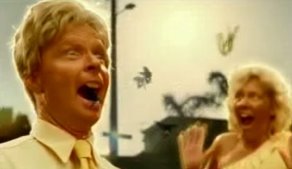Tune in, Turn On, Drop Out
The series paints an alterternately happy and scary portrait of this country's fascination with mind-altering substances. The 60's are portrayed as a(n) (unsustainable) free love "nirvana," on the bright side and Charles Manson nightmare on the dark, which turns purely hedonistic in the 70's after losing its political and philosophical trappings. The rave movement represents somewhat of a return to psychedelic form and the series ends with an admission that mood-altering substances are here to stay, inseperable from the human experience.
Yesterday and today I've read two reviews of a new biography of Timothy Leary, to some the pied piper of LSD (The New Yorker, The New York Times). Leary's life was a colorful thing, but his message turned out to be a hollow one, borne more of hedonism than enlightement. Leary left behind a number of ex-wives, and two highly damaged children. The key to the problem that was Leary's life and message is an uncritical acceptance of his ideas, but who knew? It seems that a whole counterculture was experimenting on itself, and not always with happy results. His life to me seems to encapsulate the high and the comedown of an unsustainable utopian drug experience, but one that might be highly fascinating to read about.



